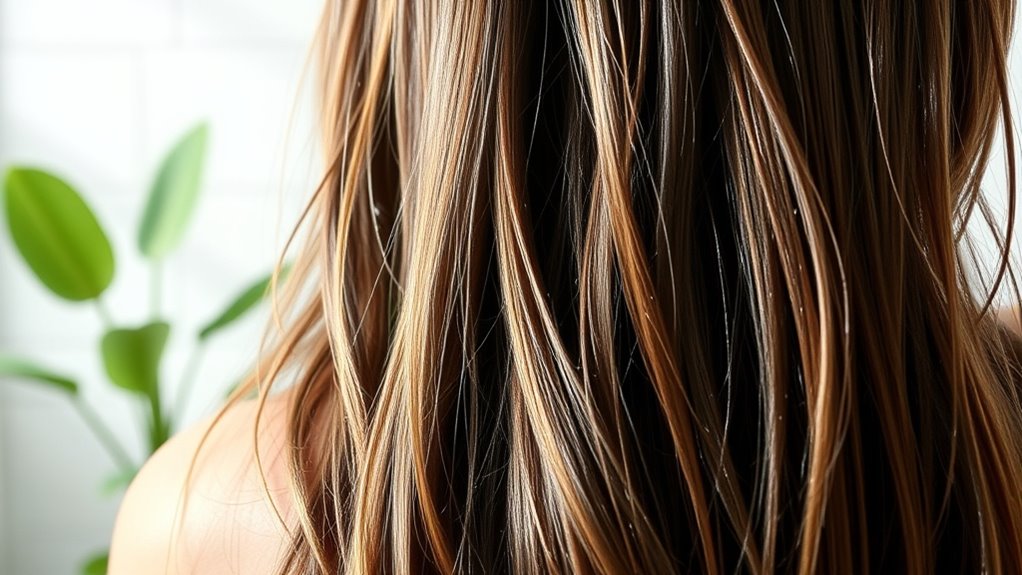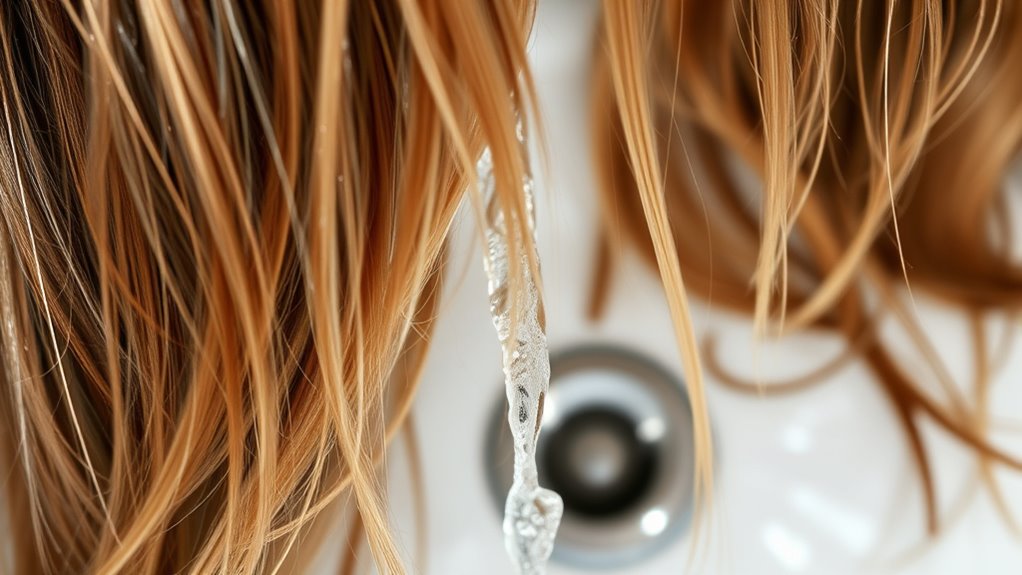How often you should wash your hair depends on your hair type, scalp health, lifestyle, and personal preferences. If you have curly or oily hair, you might need to wash less or more often to control oil or dryness. Those who exercise daily or live in humid environments may prefer more frequent washes, while others with sensitive scalps can extend intervals. To find what works best for you, consider your scalp’s feel and hair’s appearance—more details can help you create the perfect routine.
Key Takeaways
- Hair type and texture influence washing frequency; curly or coily hair benefits from less frequent washes.
- Scalp condition, such as oiliness or dandruff, determines how often washing is needed.
- Natural oil production and distribution affect the optimal interval to maintain scalp health.
- Lifestyle factors like exercise, environment, and styling product use impact wash frequency.
- Personal observations and routine adjustments help identify the ideal washing schedule for individual needs.

Deciding how often to wash your hair depends on your hair type, scalp condition, and lifestyle. Your hair texture plays a significant role in this decision because it influences how your scalp produces oil and how your hair responds to cleansing. For example, if you have curly or coily hair, your hair texture tends to be drier because the natural oils from your scalp don’t travel down the twists and turns of your curls easily. In this case, washing less frequently—perhaps once a week or even less—helps maintain scalp health and prevents your hair from becoming overly dry or brittle. Conversely, if you have straight or fine hair, oils tend to spread more evenly and quickly, so washing more often—every couple of days—may be necessary to keep your hair looking fresh and clean without weighing it down.
Your hair type influences how often you should wash—curly hair needs less frequent washing than straight hair.
Your scalp health is equally critical when deciding your wash schedule. If your scalp is oily, prone to dandruff, or prone to irritation, you might need to wash more frequently to control excess oil, remove buildup, and reduce discomfort. On the other hand, if your scalp is dry or sensitive, washing too often can strip away natural oils, leading to increased dryness, itchiness, or flakiness. In such cases, extending the time between washes allows your scalp to retain essential moisture, promoting healthier scalp health overall. Also, if you use styling products regularly, you may need to wash more often to prevent buildup that can clog pores and affect scalp health. Additionally, natural oils play a vital role in nourishing your scalp and hair, so over-washing can disrupt this balance.
Your lifestyle is another factor that influences your washing routine. Active individuals who sweat heavily or exercise daily might find themselves washing more often to remove sweat, dirt, and oils that accumulate during physical activity. If you work in a dusty environment or live in a humid climate, more frequent washing helps keep your scalp clean and comfortable. Conversely, if you have a more sedentary lifestyle or minimal exposure to environmental pollutants, you can likely extend the time between washes without compromising scalp health. It’s about balancing your comfort with your scalp and hair needs.
Ultimately, finding the right frequency for washing your hair involves paying attention to how your scalp feels and how your hair looks and behaves. Some people can go longer between washes without issues, while others need a more regular routine. Experimenting with different intervals and observing how your scalp and hair respond will help you develop a personalized routine that keeps your scalp healthy, your hair textured just right, and your confidence high.
Frequently Asked Questions
Does Washing Hair Daily Damage It?
Washing your hair daily can damage it, especially if you have dry or curly hair, as it strips natural oils. For oily scalps, daily washing might be necessary, but it can still cause dryness or irritation over time. Pay attention to your hair texture and scalp condition; adjusting your washing routine helps maintain healthy hair. Use gentle shampoos to protect your scalp and avoid over-washing.
Can Washing Less Improve Hair Health?
Washing less can definitely improve your hair health if you’re experiencing issues like hair product buildup or scalp irritation. When you wash too often, your scalp’s natural oils get stripped away, causing dryness and irritation. By reducing washing frequency, you allow your scalp to balance oil production, which can lead to healthier hair and less irritation. Just be sure to use gentle shampoos and avoid over-cleansing to keep your scalp happy.
How Does Climate Affect Hair Washing Frequency?
Climate acts like a fickle artist, painting your hair with its seasonal changes and humidity levels. In humid weather, your scalp produces more oil, so you might need to wash more often to keep your hair fresh and light. During dry seasons, less frequent washing helps prevent dryness and breakage. Embrace these climate shifts as your hair’s personal guide, adjusting your routine to nurture its natural beauty.
Is Dry Shampoo a Good Alternative?
Dry shampoo can be a good alternative if you’re looking to refresh your hair between washes. It absorbs excess oil and can extend your style. However, be cautious—frequent use may lead to scalp buildup, which can cause irritation or clogged follicles. Use it sparingly and make sure you thoroughly wash your hair regularly to prevent product buildup while maintaining healthy hair and scalp.
When Should I Switch Shampoos?
You should switch shampoos when your hair’s texture feels dull or weighed down and your scalp becomes itchy or flaky. Imagine your hair losing its bounce, like a stretched rubber band, signaling it’s time for a change. Pay attention to your scalp’s condition—if it’s irritated or overly dry, a different shampoo might restore balance. Regularly assess how your hair responds to find the perfect match for your unique needs.
Conclusion
Ultimately, how often you wash your hair depends on your hair type, lifestyle, and personal preference. Think of it like tuning a vintage radio—you need to find the right balance to keep it singing smoothly. Don’t be afraid to experiment, and remember, even Cleopatra knew the importance of adjusting her routines. So, listen to your hair’s needs, and with a little patience, you’ll discover the perfect frequency to keep your locks healthy and beautiful.









